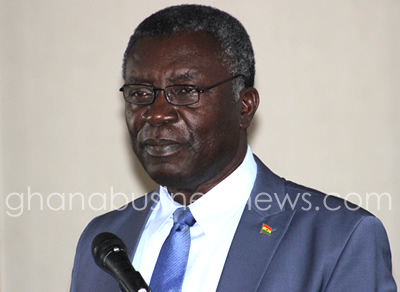Ghana hosts Global Environment Facility Workshop
 Professor Kwabena Frimpong-Boateng, Minister of Environment, Science, Technology and Innovation, Tuesday, called for a better coordination among agencies responsible for managing Africa’s natural environment to ensure the sustainable utilisation of its natural resources.
Professor Kwabena Frimpong-Boateng, Minister of Environment, Science, Technology and Innovation, Tuesday, called for a better coordination among agencies responsible for managing Africa’s natural environment to ensure the sustainable utilisation of its natural resources.
He said when Africa’s natural resources were managed properly, it would help create a viable force to conserve and sustainably utilise the countries’ natural resource base for sustainable development.
Speaking at the opening of a four-day Global Environment Facility (GEF) Expanded Constituency workshop in Accra, Prof Frimpong-Boateng stated that Africa also needed to develop good scientific data and a strong institutional capacity and commitment through public private partnership towards a more sustainable environment.
He said Ghana, like all other Africa countries, needed biodiversity-friendly policies for socio-economic transformation, adding that: “The continuous exploitation of our rich natural resources over the years has contributed to the loss of ecological integrity and compromised the ability of the ecosystem to sustainably support the life of many local communities in particular and countries in general to support our economies for sustainable development”.
The GEF Expanded Constituency workshop is a component of GEF country support programme.
The GEF unites 183 countries in partnership with international institutions, Civil Society Organisations (CSOs), and the private sector to address global environmental issues, while supporting national sustainable development initiatives.
Established on the eve of the 1992 Rio Earth Summit, to help tackle the planet’s most pressing environmental problems, the GEF has since provided over $17 billion in grants and mobilised an additional $88 billion in financing for more than 4000 projects in 170 countries.
The GEF has a unique partnership of 18 agencies, including United Nations agencies, multilateral development banks, national entities and international NGOs.
Prof Frimpong-Boateng said the meeting of all stakeholders under the GEF Expanded Constituency, in Accra, at this period, was very critical since climate change issues had become a global phenomenon that was also challenging mankind’s survival and the earth’s sustainability.
He said Ghana was also facing serious environmental challenges as climate change was having its toll on the country, with most parts of the northern sector recording increasing intense dry seasons and the coastal areas recording higher sea levels, resulting in coastal flood, sea erosion and loss of human habitat.
“Apart from all these seemingly natural events, human activities such as illegal artisanal gold mining have caused considerable land degradation, deforestation, pollution of water bodies and vegetation, loss of aquatic life in 80 per cent of the river systems in Ghana,” he noted.
The Minister, therefore, commended the GEF for championing the course of environmental quality improvement and sustainable development globally over the past 25 years.
He said Ghana acknowledged the tremendous role the GEF had also played towards environmental sustenance and sustainable livelihood development to the poor and the vulnerable communities over the years, using public institutions and private sector and also through civil society organisations under the Small Grants Programme.
He described the GEF as the best vehicle for the attainment of the UN SDGs.
However, Prof Frimpong-Boateng noted that a review of various projects supported with over 450 million dollars under the GEF facility in Ghana since 1992, was not too impressive and so there was the need for the country to ensure that good programmes that were properly monitored were implemented to benefit all Ghanaians.
Ms Franciose Clottes, Director of Strategies and Operations at GEF, said the Facility was the largest public funder of projects that aimed at improving the global environment through the provision of grants for projects related to biodiversity, climate change, international waters, land degradation, the ozone layer and persistent organic pollutants.
She explained that the purpose of the workshop was, therefore, to keep stakeholders abreast of GEF strategies, policies and procedures and to encourage coordinating, interacting with staff from GEF Secretariat and Agencies and to discuss priority issues.
It was also to help share lessons and experiences from the development and implementation of GEF projects and their integration within national policy frameworks.
Ms Clottes, therefore, urged all partner countries to strive to spend resources in a more efficient way in helping sustain the environment through proper policies as well as knowledge sharing among the countries.
Source: GNA
